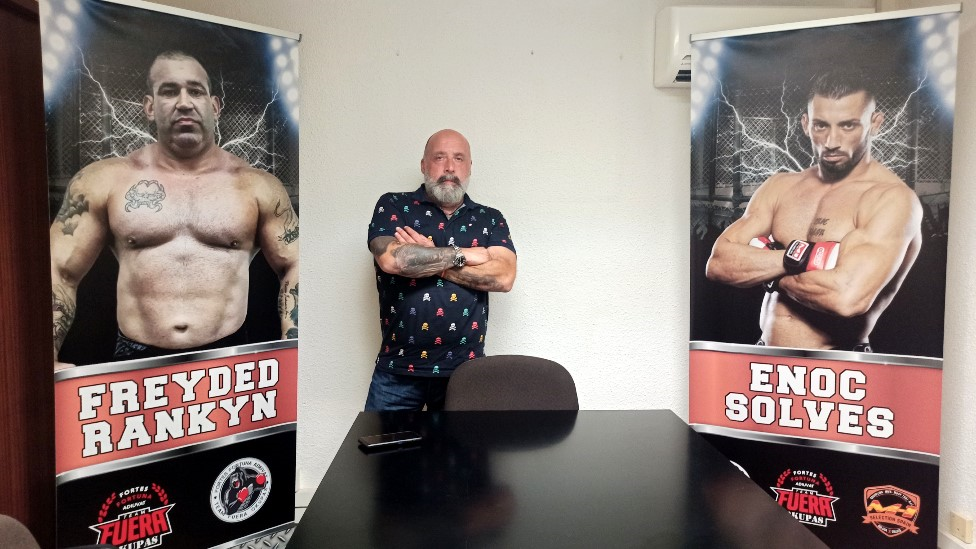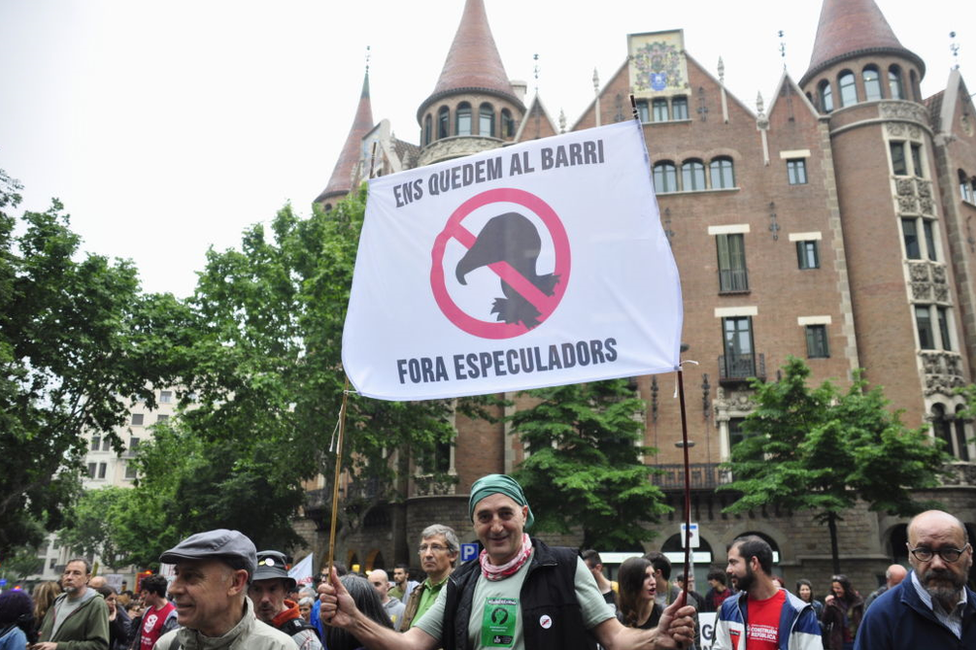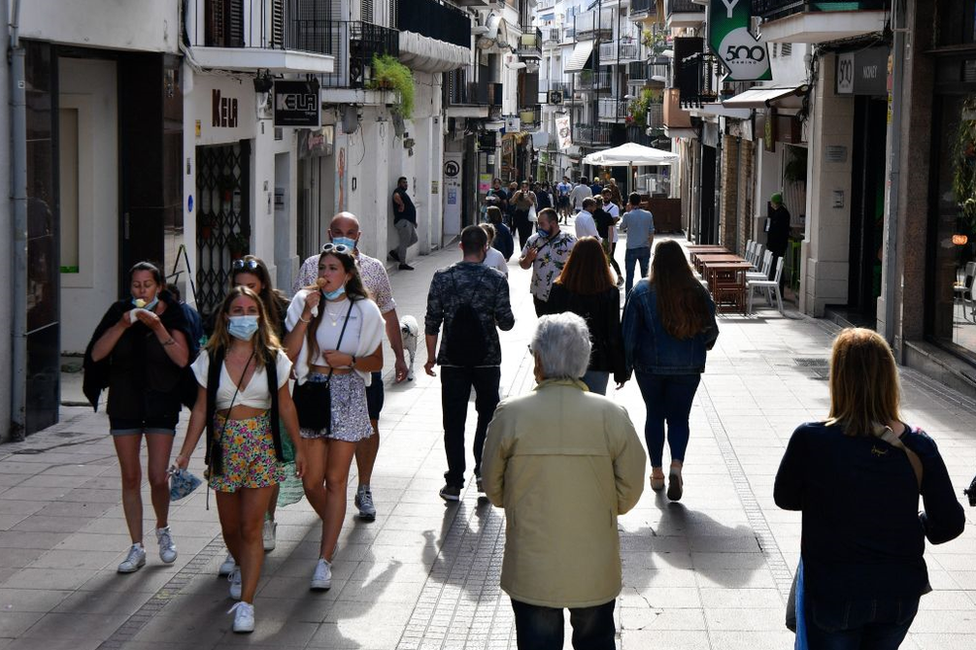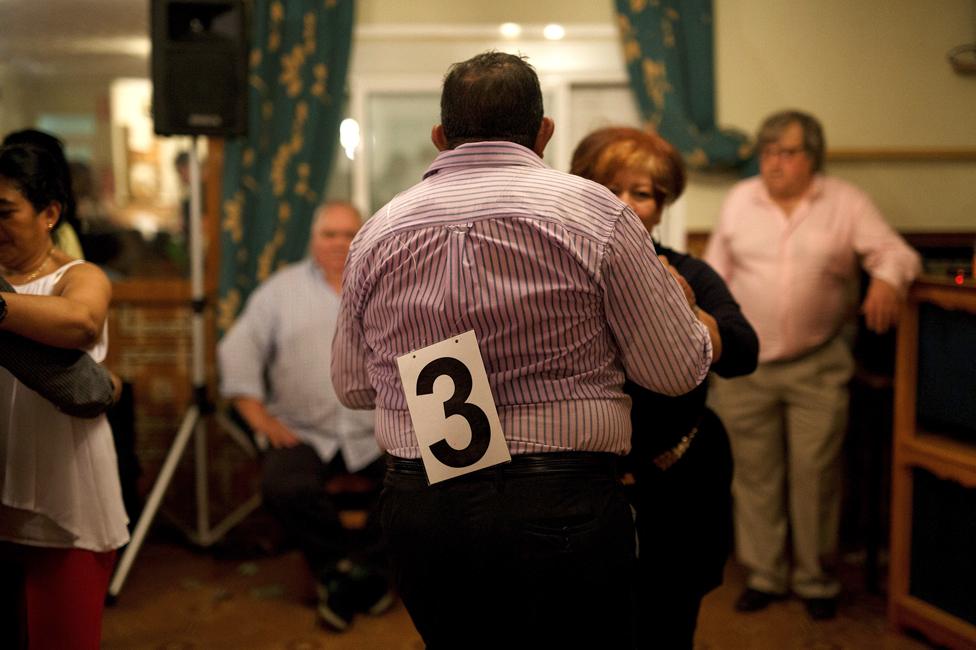The hard men removing squatters in Spain
- Published

Jorge Fe, with portraits of two FueraOkupas employees
Squatting has a long history in Spain, often fuelled by high rates of homelessness. But there is now a darker phenomenon too - squatters who demand a "ransom" before they will leave a property. And this has led to the rise of private eviction companies, some of which use threats to achieve their goal.
Michael Regan was in locked-down London when his phone pinged.
"Have you got guests staying?" the message asked him.
It was a reference to his holiday home in the Catalan seaside town of Sitges, and came from a neighbour.
"Of course, I hadn't got anyone staying, so that's when the alarm bells went," says Michael.
A Spanish friend of Michael's reported the trespassers to the police, who said they would take the case to a judge. In Spain, this is normal procedure: Spanish law allows the police to remove okupas - as squatters are known - if the owner proves it's their first, second, or even third or fourth residence, but it depends how the rules are interpreted.
They were professional extortionists, so in a way I felt relieved, because I knew we could negotiate
On Michael's terrace, a group of young men were drying their washing and playing board games, Michael learned. This was comforting news, he says.
"It wasn't a family that really needed somewhere to live - they were professional extortionists. So in a way I felt relieved, because I knew we could negotiate," he remembers.
So what were Michael's options?
He could wait for the courts to make a decision - that could take up to two years. Or he could go private.
"People advised me to hire a company that specialises in negotiating with squatters to get them out."
Enter FueraOkupas - literally translated as "Get out squatters." The company started work three years ago and now gets 150 calls a day, says director Jorge Fe - 75% about tenants who aren't paying their rent, and 25% about squatters.
His employees are boxers and martial arts experts, he says - men who are not easily daunted by the people they are trying to remove.
Once Michael Regan had agreed terms - a fee of 3,500 euros (£3,000), half paid up front - FueraOkupas visited the property in Sitges.
They understood they had to negotiate, that we were serious and wanted to reclaim the property
"It's normal when we arrive that the okupas try and intimidate us. This didn't go well for them - it never does," says Jorge Fe. "So we had a bit more than a conversation with them."
He will not be drawn on whether there was violence.
"Dealing with these kinds of people is like a children's game for us - we have champion fighters on our team," he says.
After several visits from Jorge Fe and his heavies, the squatters got the message.
"They understood they had to negotiate, that we were serious and wanted to reclaim the property. They asked for money in exchange for leaving. And that's what was agreed in this case."
Property lawyer Santi Ventalló sees extortion in 1% or 2% of the cases he handles where landlords have unwanted residents. But he believes it will become more common.
The legal system isn't working, so owners are paying squatters to get out immediately - it's something I would do too
"I think this is okupación 2.0," he says.
And the reason for that is because the courts take so long to act.
"The legal system isn't working, so owners are paying squatters to get out immediately. It's something I would do too if I had a second home or real estate assets, and they were occupied. I'd pay off the squatters to get them out. So this is a very easy way to make money."
Listen to Linda Pressly and Esperanza Escribano's report for Crossing Continents on BBC Radio 4 at 11:00 on Thursday 26 August
It's so much easier than robbing a bank, according to a man who claims to be a career criminal.
The man, who we will call Javier, spoke on condition of anonymity. He told us he was a former cocaine dealer and bank robber. But now his main illegal activity is extortion.
In Barcelona alone there are an estimated 10,000 empty flats or homes. After the crash of 2008, property prices plummeted and speculation soared. With homelessness still a big problem, unoccupied real estate is a source of grievance, especially as most of it is owned by large firms.

A protest against property speculation in Barcelona in 2012
Javier claims he and his cronies target expensive apartments owned by finance companies and banks.
"I break in on a Friday. The following Monday, I call the bank and say, 'Hey you guys, I'm in your flat, and I'm going to destroy it. I can send you pictures if you like.' And the people from the bank say, 'Whoa - we're sending someone to see you.' And then that person comes and negotiates the price."
Javier says he can make around 10,000 or 12,000 euros each time.
"The ransom depends on the quality of the flat. If it's worth one or two million euros, then they pay you more."
He claims to have broken into around 50 properties in the last year.
It is unlikely banks would admit to the BBC that they were paying off criminals, so we tried to check out what Javier told us with other contacts. Though we couldn't verify the details, no-one was surprised by his stories.

Another of Javier's scams is to change the locks of empty apartments, then sell the keys for 1,000 or 1,200 euros to impoverished people who struggle to pay a market rent - a group that has grown in size since the start of the pandemic.
"Most people buying the keys do so knowing that the seller is not the owner of the property," says lawyer Santi Ventalló.
"They buy the keys knowing the law is soft, the legal system is collapsed, and they're going to be able to stay at least one or two years."
But others can be conned into paying rent to crooks who have taken possession of the property.
That is what happened to Mariana Stirbu who moved into a flat in the La Sagrera district of Barcelona with her partner and two children three years ago.
"The two men who rented us the flat seemed like the owners - they were wearing suits and we went to sign the contract. We were paying 750 euros a month, so everything seemed fine," she says.

Mariana Stirbu in the flat her family has lived in for three years
That was not the case - and Mariana only found out when court officials arrived to evict the family, soon after they had begun living there. She showed them her paperwork, and they gave her 18 days' grace.
When social services said they could not help, Mariana turned to a housing pressure group, the PAH, set up when the property crash of 2008 left around a million people unable to pay their mortgages. And for the last three years PAH activists have prevented Mariana's family from being evicted.
In May, though, the owners of Mariana's flat - Coral Homes - evidently thought they should try a different tack.
Enter one of the other companies specialising in eviction.
"One morning, someone knocked heavily on the front door," says Mariana. "There were 20 big men outside. They said I had the option to leave with the money they could give me. Or if not, they told me they would be outside my door every day with dogs. And they said, 'We're not going to let you in or out.'"
The men were offering thousands of euros, she says, but this wasn't a long-term solution to her problem because she and her husband just don't earn enough to pay the market rent for an apartment large enough for their family.
Coral Homes told the BBC they would not comment on Mariana's case. And the eviction company did not respond to the BBC's requests to explain its actions.
What we've seen are cases of bullying and threats, and they've tried to remove vulnerable families by force
Lucía Martín, Barcelona City Council's housing minister is suspicious of eviction companies.
"What we've seen are cases of bullying and threats. And they've tried to remove vulnerable families by force, taking advantage of the fact that those people don't know the law protects them," she says.
Lucía Martín cut her political teeth in the PAH, the housing pressure group. She believes Catalonia - and Spain more widely - is dealing with the fall-out from decades of failing to invest in social housing.
Though it has now started building new homes, its policy in the meantime is to stop the evictions of vulnerable people from homes they are squatting in by negotiating with the landlord, or even paying rent so they can stay put.
Lucía Martín rejects the charge that Catalonia's squatter-friendly policies might encourage extortionists like the young men who occupied Michael Regan's flat in Sitges, or the former bank robber who claims he makes thousands of euros from demanding ransoms from property owners.
"It's a fallacy to think the mafias are going to disappear if we make squatting laws harsher," she says. "The criminals are taking advantage of a real problem, which is the lack of affordable housing."

In Sitges, Michael Regan was satisfied with the way FueraOkupas managed his situation - the squatters were out within two weeks.
"Initially they wanted 5,000 euros to leave, but Jorge was able to negotiate the figure down to 2,000 euros, and I said, 'Just pay it' - I didn't hesitate," he says.
There is a troubling question at the heart of these cases: are the eviction companies fuelling extortion demands by offering money to okupas to leave a property before they have actually asked for it?
Jorge Fe of FueraOkupas says he has never done this. But Mariana Stirbu claims the eviction firm that visited her immediately offered her money to leave.
Michael Regan is not surprised.
"When I started to investigate different companies, one of them wanted 6,000 euros up front, and they said half of that would be immediately paid to the squatters, and the other half would be the company's fee. I was told not to do that," he remembers. That's why he chose FueraOkupas, he says.

Sitges, the town near Barcelona, where Michael Regan has a holiday home
The BBC has heard from home-owners across Spain who are in the process of trying to reclaim their properties. Often the squatters had moved into a property as bona fide tenants, but then stopped paying rent after a month or two. Perhaps some were waiting for an eviction company to offer them a payoff?
And there continue to be rumours about the relationship between eviction companies and criminal squatter gangs.
"They might even be linked," says Michael Regan. "I've heard very strange stories - it is quite murky."
A new alarm system protects his apartment now.
The young men who passed their time playing board games at his flat did not damage the property, but they did steal all Michael's and his partner's clothes. They left just one pair of shoes in the wardrobe - a pair of leopard-skin lace-ups.

Photos by Esperanza Escribano unless otherwise stated.
You may also be interested in:

Spain is ground-zero for rural depopulation within the European Union. Over decades, millions have migrated to the cities to find jobs. Those left behind in villages are often elderly - or they are single men working in agriculture. So how does a lonely Spanish shepherd find love?